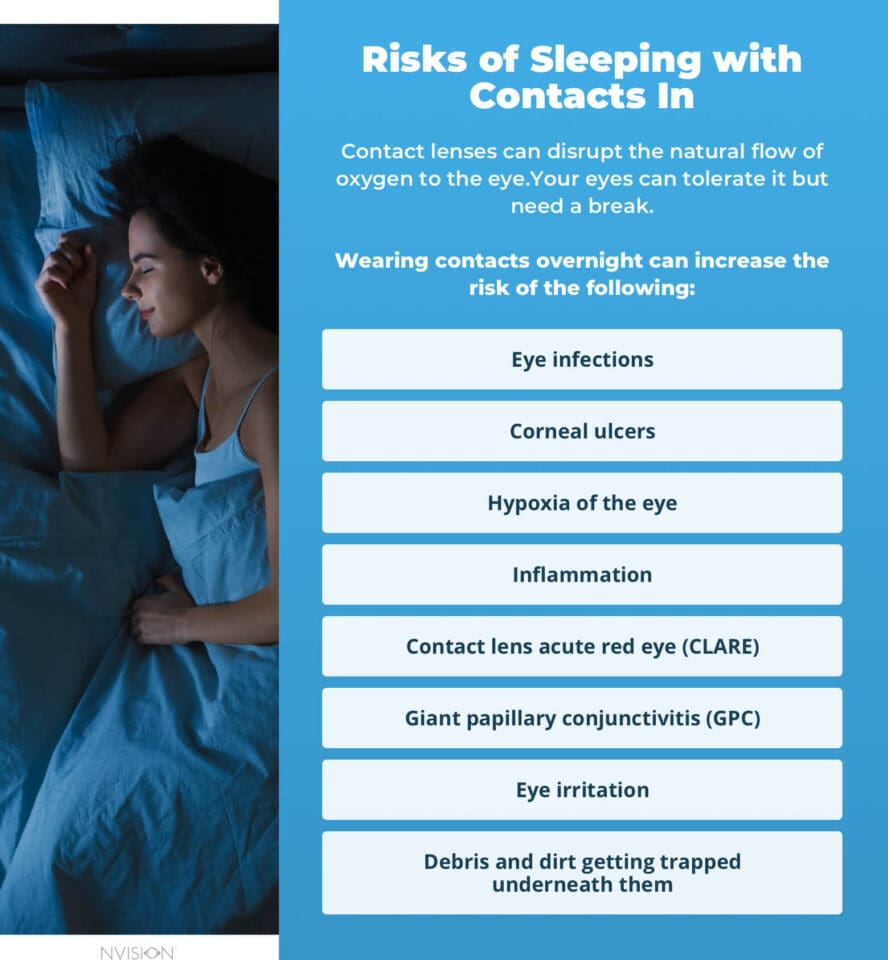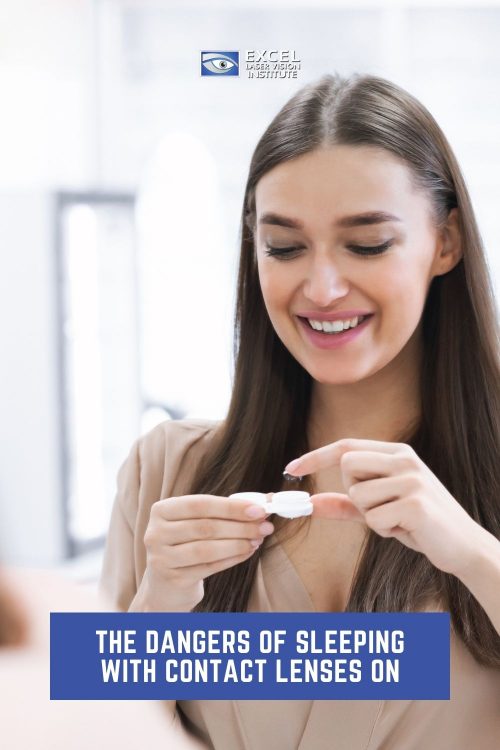Ever considered the seemingly innocuous act of dozing off with your contacts in? The reality is stark: sleeping in contact lenses, a habit indulged in by a surprising number, drastically elevates your risk of severe eye infections and potentially vision-threatening complications.
The Centers for Disease Control and Prevention (CDC) has issued warnings highlighting the increased susceptibility to eye infections when contacts are worn overnight. A history of incidents, marked by patients grappling with serious corneal infections linked to this very practice, underscores the gravity of the situation. The statistics are compelling: sleeping in contacts makes you six to eight times more likely to contract an eye infection. This isn't limited to extended periods of slumber; even short naps with lenses in can be detrimental to ocular health.
While silicone hydrogel lenses are often marketed for their extended wear capabilities, it's crucial to acknowledge that they are not without risk. The use of these lenses should be strictly guided and monitored by an eye care professional. Alarmingly, data suggests that roughly a third of the 45 million contact lens wearers in the United States admit to sleeping with their contacts in. This widespread practice, often driven by convenience or forgetfulness, places a significant portion of the population at heightened risk.
One of the most significant risks associated with sleeping in contact lenses is the development of keratitis, an inflammation of the cornea. During sleep, the cornea's oxygen supply is reduced, making it more vulnerable to injury and infection. If the cornea becomes scratched or damaged, bacteria, amoebae, or other microorganisms can enter, leading to infectious keratitis, a potentially sight-threatening condition. While contacts themselves rarely harm the cornea, wearing lenses not specifically designed for extended wear during sleep dramatically increases the likelihood of corneal infections or even ulcers.
A 2018 report detailed the experiences of six individuals who suffered severe eye infections after sleeping in their soft contact lenses. These real-life accounts serve as cautionary tales, highlighting the potential consequences of a seemingly harmless habit. Social media platforms, such as TikTok, have also become avenues for sharing personal experiences. A video posted by @nonaeyemd, for example, recounts "Becky's experience with an eye infection," emphasizing the risks associated with sleeping in contacts. The video garnered significant attention, with over 1400 likes, demonstrating the growing awareness and concern surrounding this issue.
The message is clear: never go to sleep in your contact lenses. This simple act of removing your lenses before bed can significantly reduce your risk of developing serious eye problems. Its also crucial to remove your contacts before swimming, as exposure to water can introduce harmful microorganisms to your eyes.
If there's one takeaway from all this, it's that sleeping in contacts is one of the most detrimental things you can do to your eye health. When your eyes are closed, the oxygen supply to the cornea is further reduced, creating an environment conducive to infection and inflammation. Many individuals opt for contact lenses over glasses for aesthetic reasons or to avoid interference with sports and physical activities. While contact lenses offer numerous benefits, including improved vision and enhanced convenience, neglecting proper contact lens hygiene can lead to infections and other complications.
Incorrectly worn contact lenses can lead to serious problems such as corneal infection, extreme pain, light sensitivity, and even permanent vision loss. It's essential to avoid sleeping in contact lenses unless specifically advised to do so by an eye care professional. The Center for Contact Lens Research (CCLR) emphasizes that sleeping in contacts is associated with a tenfold greater risk of microbial keratitis. Keratitis can be caused by infections from various organisms, including amoebae, bacteria, and fungi. Therefore, the short answer to the question of whether sleeping with contacts is safe is a resounding "no," unless otherwise directed by your eye doctor.
Sleeping with contact lenses in poses significant risks to your eye health. Even a single instance of sleeping in contacts can cause damage to your cornea, though the severity of the impact can vary depending on individual sensitivity. If a lens becomes tight on your eye during sleep, it can create tiny tears on the cornea, increasing the risk of infection. Sleeping in contacts can lead to various levels of inflammation and a range of infections, from mildly irritating to extremely dangerous. These conditions include inflammatory responses of the inner eyelid, characterized by redness, itching, discomfort, and small bumps underneath the eyelids.
Contact lenses have revolutionized vision correction, offering a convenient alternative to glasses and providing users with greater freedom and flexibility. However, despite their many advantages, contact lenses carry potential risks if not used and maintained properly. Sleeping in contacts can increase the risk of eye infections, corneal ulcers, and other health problems that can lead to permanent vision loss. Specifically, sleeping in daily wear contacts can dry out your eyes and significantly increase the risk of infections, redness, and permanent damage to the cornea.
Wearing contact lenses while you sleep, even for a short nap, can put your eyes at serious risk. If your eyes feel red, dry, or uncomfortable after sleeping in your lenses, remove them immediately and schedule an eye exam with your eye care professional. Failing to remove daily contacts before sleeping can lead to various infections and eye conditions. The most serious risks include bacterial or fungal infections, as the reduced oxygen supply weakens the corneas defenses.
Sleeping in contact lenses may seem like a minor infraction, but the potential risksincluding corneal abrasions and serious infectionsare too significant to ignore. Prioritizing good contact lens hygiene and diligently following your eye doctors recommendations are paramount in protecting your vision and maintaining healthy eyes.



Detail Author:
- Name : Bart Wisoky
- Username : frederick.little
- Email : buddy.kemmer@dicki.net
- Birthdate : 1985-09-23
- Address : 1986 Bednar Fort Suite 848 Lake Dixietown, WA 81603
- Phone : 1-934-787-0397
- Company : Jaskolski-Thompson
- Job : Postal Service Mail Sorter
- Bio : Debitis officia dolor nulla qui cumque quas quos. Sequi nihil repudiandae saepe reprehenderit recusandae ducimus molestiae.
Socials
twitter:
- url : https://twitter.com/willms2003
- username : willms2003
- bio : Laudantium et quia ut non. Rem fugiat quis eius consectetur. Nisi culpa aut aut fuga id. Quis commodi id quia odio sequi sit aut et.
- followers : 6095
- following : 431
facebook:
- url : https://facebook.com/anitawillms
- username : anitawillms
- bio : Aliquam tenetur dolorem inventore asperiores quas.
- followers : 5020
- following : 1940
linkedin:
- url : https://linkedin.com/in/anita8510
- username : anita8510
- bio : Totam corporis quia enim ab consequatur et.
- followers : 1359
- following : 1496